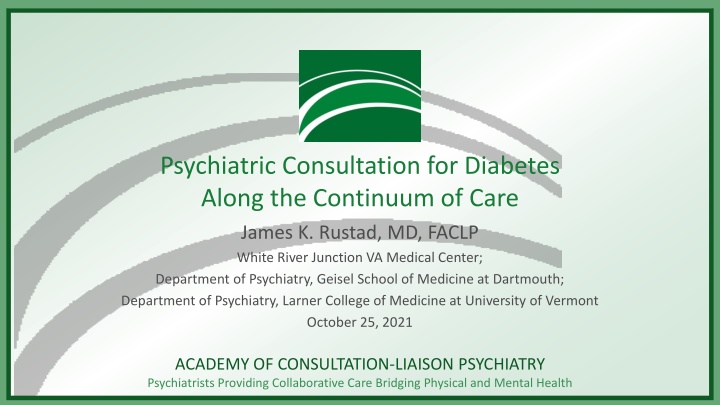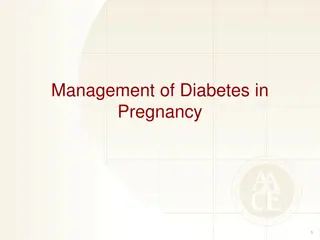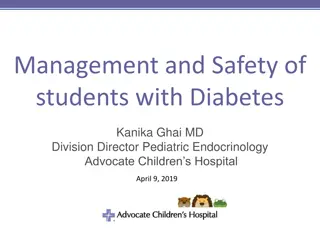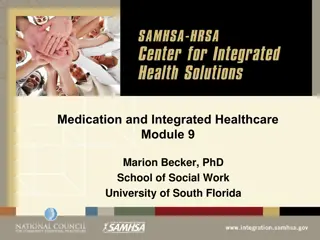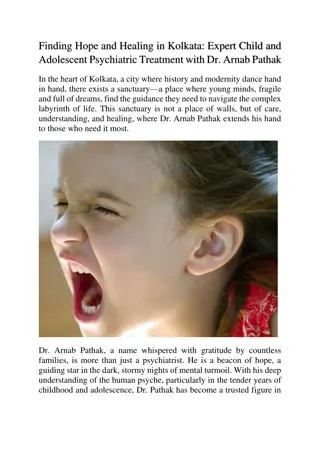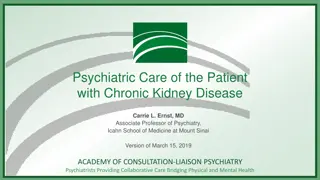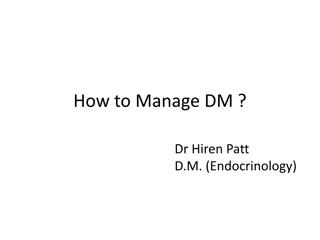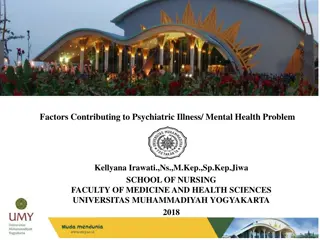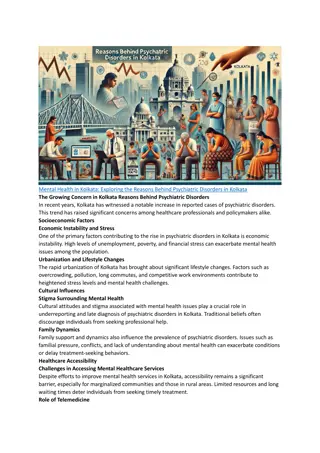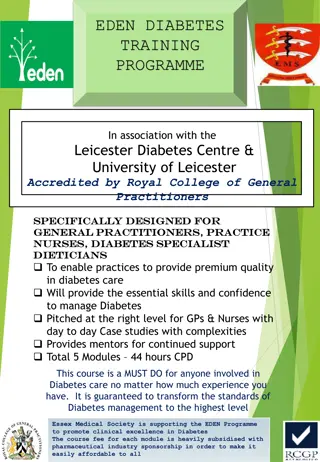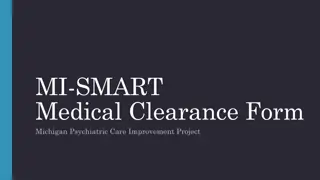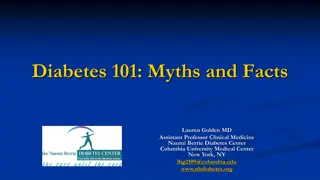Psychiatric Consultation for Diabetes: Enhancing Care at the Intersection of Mental and Physical Health
This presentation by Dr. James K. Rustad explores the critical role of consultation-liaison psychiatrists in managing diabetes along with mental health conditions like schizophrenia. It delves into the prevalence of diabetes, particularly among specific demographic groups, and highlights the complex relationship between diabetes and schizophrenia. Strategies for addressing clinical challenges, providing evidence-based treatments, and improving collaborative care are detailed. The session underscores the need for holistic care to bridge the gap between physical and mental health in patients with diabetes.
Download Presentation

Please find below an Image/Link to download the presentation.
The content on the website is provided AS IS for your information and personal use only. It may not be sold, licensed, or shared on other websites without obtaining consent from the author.If you encounter any issues during the download, it is possible that the publisher has removed the file from their server.
You are allowed to download the files provided on this website for personal or commercial use, subject to the condition that they are used lawfully. All files are the property of their respective owners.
The content on the website is provided AS IS for your information and personal use only. It may not be sold, licensed, or shared on other websites without obtaining consent from the author.
E N D
Presentation Transcript
Psychiatric Consultation for Diabetes Along the Continuum of Care James K. Rustad, MD, FACLP White River Junction VA Medical Center; Department of Psychiatry, Geisel School of Medicine at Dartmouth; Department of Psychiatry, Larner College of Medicine at University of Vermont October 25, 2021 ACADEMY OF CONSULTATION-LIAISON PSYCHIATRY Psychiatrists Providing Collaborative Care Bridging Physical and Mental Health
Disclosures Dr. Rustad has no conflicts of interest to report. Dr. Rustad is employed by the United States (US) Department of Veterans Affairs, but the views expressed in this presentation do not reflect those of the Department of Veterans Affairs or the US government. Academy of Consultation-Liaison Psychiatry 2
Learning Objectives 1. Review common consultation questions encountered by CL psychiatrists while caring for patients with diabetes 2. Learn strategies to address complex clinical situations which occur while treating patients with diabetes 3. Describe the role of CL psychiatrists in providing evidence-based treatments (e.g., collaborative care) for co-managing diabetes and depression Academy of Consultation-Liaison Psychiatry
Epidemiology According to the CDC National Diabetes Statistics Report for 2020 34.2 million people (10.2% of the population) had diabetes in the United States (U.S.) Prevalence of diabetes: American Indians/Alaska Natives (14.7%) People of Hispanic origin (12.5%) Non-Hispanic Blacks (11.7%) Asian (9.2%) Non-Hispanic Whites (7.5%) 7.3 million people have undiagnosed diabetes (2.8% of all adults in the U.S. and 21.4% of all adults in the U.S. with diabetes) Type 1 diabetes accounts for about 5.2% of all diagnosed cases of diabetes and affects approximately 1.6 million people 88 million American adults (approximately 1 in 3) have prediabetes CDC, 2020 Academy of Consultation-Liaison Psychiatry
Diabetes and Schizophrenia Individuals with schizophrenia have double the likelihood of developing type 2 diabetes compared to those without schizophrenia Stubbs et al., 2015 Reduced life expectancy by approximately 20 years compared to the general population, with much of the excess mortality attributed to higher rates of cardiovascular disease (CVD) Atypical antipsychotic medications can cause metabolic syndrome and glucose dysregulation increase the risk of diabetes and premature CVD-related mortality Increased risk of diabetes in schizophrenia exists independent of antipsychotic medication Smoking, poor diet, obesity, and lower levels of physical activity in patients with schizophrenia also contribute to increased risk of diabetes and CVD Price and Ismail, 2018 Academy of Consultation-Liaison Psychiatry 5
Diabetes and Anxiety disorders Anxiety disorders: overall prevalence of anxiety disorders in persons with type 2 diabetes was 18%, which is greater than double that of rates in the general population Chaturvedi et al., 2019 Academy of Consultation-Liaison Psychiatry 6
Diabetes and Dementia Persons with diabetes have a 47% increased risk for all-cause dementia Lu et al., 2009 Increased risk of hypoglycemia in those aged over 60 years Attributed to polypharmacy, altered eating habits, and poor nutrition Cognitive impairment is associated with deficits in diabetes self-management Impaired adherence to medications and clinic appointments Challenges with insulin administration technique Inability to recognize or self-manage episodes of hypoglycemia Adverse outcomes of hypoglycemia Worsening cognitive impairment Further malnutrition Falls and associated fractures Cardiovascular and cerebrovascular events Increased hospital admissions and mortality Price and Ismail, 2018 Academy of Consultation-Liaison Psychiatry 7
Diabetes and Dementia If there are concerns that impaired cognition is hindering diabetes self-management a psychiatric evaluation including a cognitive assessment, and physical and occupational therapy evaluations can be helpful Neuropsychological testing may also aid in determining neurocognitive deficits Decision-making capacity evaluation may be warranted to assess ability to make medical, discharge, and/or financial decisions Medication review should be conducted periodically to minimize risk E.g., use anti-diabetes drugs with low risk of hypoglycemia and frequent review of insulin regimen and dose schedule with patients Palliative care and risk minimization approaches are indicated in advanced dementia Academy of Consultation-Liaison Psychiatry 8
Diabetes and Recurrent Diabetes Ketoacidosis In young adults with type 1 diabetes who are hospitalized recurrent diabetic ketoacidosis (DKA) is a common presentation Recurrent DKA is often not medically explained Psychiatric disorders (e.g., eating disorder, personality disorder, depressive disorders) are often present Patients who intentionally avoid taking medications may require inpatient psychiatric hospitalization following recurrent DKA Treatment planning: family therapy, enhanced diabetes support, and active follow-up by diabetes educators may reduce admissions Price and Ismail, 2018 Academy of Consultation-Liaison Psychiatry 9
Diabetes and Delirium Delirium may occur secondary to diabetic ketoacidosis (DKA), hyperosmolar hyperglycemic state (HHS), and hypoglycemia Diabetic ketoacidosis and hyperosmolar hyperglycemic state: Medical emergencies that require prompt evaluation and treatment Risk factors include type 1 diabetes, major medical illness, eating disorders and cocaine use Evolve rapidly over a 24 hour period for DKA and more insidious with HHS Progression: polyuria, polydipsia, and weight loss lethargy, confusion, focal signs, and obtundation coma Evaluation: Serum glucose, electrolytes, anion gap, BUN, CBC, urine ketones (serum ketones if urine positive), plasma osmolality, arterial blood gas, CBC and ECG Consider urine, sputum, and blood cultures, serum lipase and amylase, and chest radiograph on a case-by-case basis. Management includes the correction of fluid and electrolyte abnormalities and administration of insulin. Academy of Consultation-Liaison Psychiatry 10
Antidiabetic agents, suicide attempts, and hypoglycemia Sulfonylureas and insulin are antidiabetics agents when taken as overdoses can be lethal or cause serious complications including hypoglycemic encephalopathy Diaphoresis, tachycardia, anxiety, and hunger are early signs of hypoglycemia If left untreated can progress to hypoglycemic encephalopathy characterized by confusion, lethargy, delirium, seizures and coma Prolonged hypoglycemia may lead to irreversible brain damage Following medical stabilization, patients antidiabetic regimen may need to be re- evaluated with regard to risk/benefit profile Patients with intentional overdoses may require inpatient psychiatric hospitalization following hypoglycemia Academy of Consultation-Liaison Psychiatry 11
Diabetes and Eating Disorders Insulin restriction has been reported in up to 40% of young women with diabetes Associated with an increase in HbA1c, diabetes complications, and increased mortality Patients with eating disorders or those who engage in insulin restriction behaviors frequently miss appointments and are lost to follow-up Patients with comorbid diabetes and eating disorders have atypical presentations Tend to weigh more than those with eating disorders alone Unhealthy eating patterns are easier to mask with insulin reduction Purging by insulin omission (or glycosuria) is more easily kept secret than purging by vomiting or diarrheal agents, or other disturbed eating behaviors such as dieting, fasting, binge eating or excess exercise Extreme hyperglycemia can be maintained without ketosis by low levels of long-acting insulin Academy of Consultation-Liaison Psychiatry 12
Diabetes and Eating Disorders Treatment Planning: Acute Refeeding for anorexia and Type 1 diabetes should be managed with the diabetes team because of risks of hypoglycemia and hypophosphatemia Restarting insulin steadily may be more acceptable to the patient than administering higher doses initially (except in the case of a medical emergency like diabetic ketoacidosis) Administration of therapeutic levels of insulin after a period of omission leads to immediate weight gain that can be distressing Recommend setting goals on rate of increase of insulin increase in collaboration with patient (e.g., increase by 1 unit/week for 2 weeks before reviewing) Long-term care Weight and shape concerns associated with insulin use and managing perceived criticism should be addressed Routine monitoring for disordered eating behaviors and insulin omission Price and Ismail, 2018 Academy of Consultation-Liaison Psychiatry 13
Diabetes and Factitious Disorder Maintain awareness that patients may mislead their care teams by deliberately over- or under- titrating insulin to cause hypoglycemia or hyperglycemia Factitious Hypoglycemia High morbidity and mortality; often misdiagnosed Average age mid-30s Female: male ratio approximately 4:1 Medical occupations or past medical training is common Comorbid diabetes (53%) C-peptide levels and insulin assays can help identify factitious hypoglycemia over other causes of hypoglycemia Management should include a focus on psychiatric treatment Kyriacou et al., 2020 Strategies for managing patients with co-morbid personality disorder or maladaptive personality traits are more likely to be successful if patients and family are involved Writing down treatment agreements can be helpful Academy of Consultation-Liaison Psychiatry 14
Diabetes and Substance Use Disorders Alcohol consumption is associated with hypoglycemia Risk can be increased further by the concomitant use of hypoglycemic agents Substance use disorders and diabetes significantly increase risk of hospitalization, unplanned hospital admissions, longer hospitalizations, amputations and premature death from diabetes complications relative to matched controls (those without diabetes) Substance use disorders reduce adherence with medications, diabetes case appointments, and recommended lifestyle measures such as diet and exercise Alcohol use disorder may lead to pancreatitis which contributes to diabetes, pancreatic insufficiency, and chronic pain Price and Ismail, 2018 Academy of Consultation-Liaison Psychiatry 15
Diabetes and Depression: Epidemiology Likelihood of depression in those with diabetes is 1.5-2 times that of those without diabetes Prevalence of diabetes in depression is approximately 14 - 27% Anderson et al., 2001; Ali et al., 2006; Wang et al., 2019 Prevalence rates for depression in persons with type 1 diabetes (21.3%) vs. type 2 diabetes (27%) are similar Anderson et al., 2001 Depression is an independent risk factor for development of type 2 diabetes Those with depression are approximately 1.4 times more likely to develop diabetes relative to those without depression Yu et al., 2015; Vancampfort et al., 2015 Academy of Consultation-Liaison Psychiatry
Diabetes and Depression: Impact Those with comorbid diabetes and depression have negative health outcomes Less likely to adhere to diabetes self-care and greater challenges with glycemic control More functional disability and lower life expectancy Greater length of hospital stays Increased prevalence of end-organ diabetic disease: retinopathy, nephropathy, neuropathy, sexual dysfunction, and macrovascular complications Gonzalez et al., 2007; Egede et al., 2004; Davydow et al., 2011; Coleman et al., 2013 Higher risk of cognitive decline and dementia Sullivan et al., 2013; Exalto et al., 2013; Katon et al., 2015 Depression and diabetes are independently associated with greater dementia risk and the combined association of the two disorders was stronger than additive risk of all-cause dementia Katon et al., 2015 Academy of Consultation-Liaison Psychiatry
Diabetes and depression: Pathophysiology The relationship between diabetes and MDD is most likely to be bidirectional and the causes are multifactorial In part relationship between MDD and diabetes is related to the burden of chronic disease management Physiological correlates of MDD including hyperactivity of the hypothalamic pituitary adrenal (HPA) axis and sympathomedullary activation can lead to decreased glucose transport and insulin resistance MDD is associated with reduced physical activity levels which can contribute to obesity, increased cortisol levels, and insulin resistance Over-activation of innate immunity leading to a cytokine-mediated inflammatory response has been proposed as a shared mechanism In type 1 diabetes, the burden of a lifelong disorder with an onset early in personality development might contribute to increased vulnerability to depression Holt et al., 2014; Rustad et al., 2011; Moulton et al., 2020 Academy of Consultation-Liaison Psychiatry
Diagnosing Depression in Patients with Diabetes Clinical interview is still the standard of care for diagnosis of depressive disorders in clinical practice Validated screening tools Center for Epidemiologic Studies Depression Scale (CES-D) highest sensitivity Patient Health Questionnaire 9 (PHQ-9) highest specificity de Joode et al., 2019 Academy of Consultation-Liaison Psychiatry 19
Diagnostic considerations: Stress of diabetes management Type 2 diabetes and its attendant health concerns, challenges of management, and biological progression is associated with depressive symptoms Rhee et al., 2008 Psychological stress associated with management of diabetes, its complications, and co-morbidities may lead to worsened depressive symptoms in those of diabetes Golden et al., 2008 Academy of Consultation-Liaison Psychiatry
Diagnostic considerations: Diabetes Distress vs. MDD A new descriptive term has emerged called diabetes distress, defined as an emotional state that causes significant emotional distress but does not meet the qualifications for MDD Symptoms of Diabetes Distress: Emotional response varies across individuals and may include feeling unmotivated, burned out, overwhelmed, frustrated, defeated, angry, guilty, in denial, fearful (of hypoglycemia or complications), lonely Behaviors may include poor self-care behaviors and lack of adherence to diabetes regimen Diabetes distress adversely affects health outcomes including HbA1C Kreider et al., 2017 Academy of Consultation-Liaison Psychiatry 21
Diabetes self-management education Diabetes self-management education is an effective treatment for diabetes distress Interventions that target enhanced self-management reduce diabetes distress significantly Diabetes distress-specific interventions may be necessary for patients with initially high levels of regimen distress Regimen distress distress related to managing blood glucose and diet Generates the most distress and displays the greatest distress reduction within overall diabetes distress as a result of intervention For those with initially high regimen distress, which is a significant portion of populations with type 2 diabetes, focus on improving disease management alone may be insufficient; a specific focus on regimen distress may be required Fisher et al., 2013 Academy of Consultation-Liaison Psychiatry 22
Treatment Three types of therapeutic modalities have been utilized to ameliorate depression in patients with diabetes: Psychotherapy Pharmacotherapy (i.e., antidepressants) Collaborative care A meta-analysis of 14 RCTs (n = 1724) evaluating the efficacy of interventions designed to treat depression in patients with diabetes Effect size was large (-0.581) for improvement in depressive symptoms following psychotherapeutic interventions in tandem with educational interventions focused on diabetes self-care Effect size was moderate (-0.467) for pharmacological interventions Van der Feltz-Cornellis et al., 2010 Academy of Consultation-Liaison Psychiatry
Psychotherapy Cognitive behavioral therapy (CBT) can improve medication adherence, depressive symptoms, and glycemic control in patients with type 2 diabetes Safren et al., 2014 Other effective approaches include interpersonal therapy, motivational interviewing, psychodynamic therapy, and Web-based therapeutic approaches Most of the studies include people with type 2 diabetes and there is a more limited knowledge base about how psychologically-based interventions affect people with type 2 diabetes Holt et al., 2014 Academy of Consultation-Liaison Psychiatry
Pharmacology All SSRIs seem to be equally efficacious at reducing depressive symptoms at appropriate doses with excellent safety profile Markowitz et al., 2011 Sertraline and fluoxetine may have a slight benefit to glycemic control but these results have not been widely replicated van der Feltz-Cornelis et al., 2010; Ye et al., 2011 Bupropion may induce weight loss in people with diabetes and MDD, potentially leading to improved cardiovascular risk profile Hollander et al., 2013 Medications should be selected based upon side effect profiles, patient preferences, and individual response to treatment National Collaborating Centre for Mental Health, 2011 Tricyclic antidepressants and monoamine oxidase inhibitors are rarely recommended for patients with diabetes because of unfavorable side effect profile Academy of Consultation-Liaison Psychiatry 25
Collaborative care The collaborative care model is an evidence-based care delivery model started by Wayne Katon and colleagues at the University of Washington. The model is designed to provide psychiatric consultation in the primary care setting and has been adapted to a variety of medical specialty clinics Katon et al., 1995 Core members of team include a primary care provider, behavioral health care manager and consulting psychiatrist. Behavioral health care managers are embedded in primary care clinics and play various roles: Participating in diagnosis and treatment planning Coordinating treatment Providing proactive follow-up to assess treatment response Supporting medication management Facilitating communication between team members Offering brief psychotherapies Raney et al., 2015 Academy of Consultation-Liaison Psychiatry
Role of the Psychiatrist in Collaborative Care Provide indirect consultation (informal or curbside ) to increase access to psychiatric expertise Develop capacity of primary care providers through training to treat commonly occurring mental health conditions Provide immediate recommendations to primary care and behavioral health specialists regarding diagnosis and management Provide direct consultation for patients who are not improving Review of cases within registry to intensify or step-up care when patients do not respond to current treatments Raney et al., 2015 Academy of Consultation-Liaison Psychiatry 27
Collaborative Care for Depression and Diabetes: Key points Systematic review and meta-analysis of collaborative care for comorbid depression and diabetes showed that alleviating depressive symptoms does not reliably confer improvements in self-care and glycemic control (when depression treatment does not specifically target adherence to diabetes treatment) Atlantis et al., 2014 Quality improvement strategies for diabetes care that promote glucose self- monitoring among patients can significantly improve the HbA1c level (Standard Mean Difference [SMD] was 0.57% (0.31% to 0.83)) (Tricco et al., 2012) Indeed, evidence from sensitivity analysis by Atlantis et al. (2014) showed that the effect of collaborative care on HbA1c was almost entirely confined to the three studies that integrated diabetes care within the collaborative care model (Bogner et al., 2010; Bogner et al., 2012; Katon et al. 2010) Academy of Consultation-Liaison Psychiatry
TEAMcare A collaborative care single blind RCT with 214 patients with poorly controlled diabetes, coronary heart disease, or both, and coexisting depression Randomly assigned to usual-care or collaborative care intervention 37% of intervention patients achieved combined primary outcome vs. 22% of usual care patients HbA1c < 7.0% or decrease 0.5%; SBP < 130 or decrease 10 mmHg; and LDL < 100 or decrease 15% 60% of intervention patients achieved depression response ( 50% decrease in Symptom Checklist-20 score) at 12 months vs. 30% of usual care patients Katon et al., 2010 Academy of Consultation-Liaison Psychiatry
COMPASS 18 medical groups and 172 clinics adapted TEAMcare interventions to establish collaborative care management delivery, enrolling 3609 patients Intensive case management using rigorous treat-to-target guidelines for depression, diabetes, and cardiovascular disease 23% of patients achieved HbA1c goal (HbA1c < 8.0%) 58% of patients achieved blood pressure goals (SBP < 140 and DBP < 90) 40% achieved either depression remission or response Remission = PHQ-9 < 5 Response = > 50% reduction in PHQ-9 score from baseline Rossom et al., 2017 Academy of Consultation-Liaison Psychiatry
Be aggressive! B-E Aggressive In a secondary data analysis of electronic health record data, prescriptions, and doses of anti-depressant medication were compared for patients with and without six co-morbid conditions [diabetes, coronary heart disease, congestive heart failure, cerebrovascular disease, cancer, chronic obstructive pulmonary disease] Patients with multiple co-morbidities were less likely to be prescribed anti- depressant medications (adjusted odds ratio, 0.58 [95% CI, 0.35-0.96]) No significant difference by individual co-morbidities Gill et al., 2010 Many lost opportunities for effective treatment since those with diabetes and depression respond well to treatment for depression Maintain high vigilance for depression in diabetes and treat until remission is achieved Academy of Consultation-Liaison Psychiatry
Conclusions There are higher rates of neuropsychiatric disorders such as eating disorders, depression, anxiety, delirium, and dementia for individuals with diabetes relative to those without Depressive disorders are common in diabetes and are frequently encountered by CL psychiatrists Diabetes distress is distinct from major depressive disorder and adversely affects diabetes management Psychotherapeutic and psychopharmacologic treatments are efficacious for treatment of depression in diabetes The collaborative care model provides an effective framework to treat co-morbid diabetes and depression Academy of Consultation-Liaison Psychiatry
REFERENCES Centers for Disease Control National Diabetes Statistics Report for 2020. Obtained on December 13, 2020 from: https://www.cdc.gov/diabetes/pdfs/data/statistics/national-diabetes-statistics-report.pdf Stubbs B, Vancampfort D, De Hert M, Mitchell AJ. The prevalence and predictors of type two diabetes mellitus in people with schizophrenia: a systematic review and comparative meta-analysis. Acta Psychiatr Scand 2015; 132: 144 157 Price HC, Ismail K; Joint British Diabetes Societies (JBDS) for Inpatient Care. Royal College of Psychiatrists Liaison Faculty & Joint British Diabetes Societies (JBDS): guidelines for the management of diabetes in adults and children with psychiatric disorders in inpatient settings. Diabet Med. 2018 Aug; 35(8): 997-1004 Chaturvedi SK, Manche Gowda S, Ahmed HU, et al. More anxious than depressed: prevalence and correlates in a 15-nation study of anxiety disorders in people with type 2 diabetes mellitus. Gen Psychiatr. 2019; 32(4):e100076 Lu FP, Lin KP, Kuo HK. Diabetes and the risk of multi-system aging phenotypes: a systematic review and meta-analysis. PLoS One. 2009; 4(1):e4144 Kyriacou H, Duggleby W, Hatoum A, Khan T, Manley G, Filippidou M. Factitious Hypoglycaemia: A Case Report and Literature Review. Psychiatr Danub. 2020 Sep;32(Suppl 1):121-129. PMID: 32890374. Rustad JK, Musselman DL, Nemeroff CB. The relationship of depression and diabetes: pathophysiological and treatment implications. Psychoneuroendocrinology 2011 Oct; 36(9): 1276-86 Anderson RJ, Freedland KE, Clouse RE, et al.: The prevalence of co-morbid depression in adults with diabetes: a meta-analysis. Diabetes Care 24: 1069-1078, 2001 Ali S, Stone MA, Peters JL, Davies JL, et al.: The prevalence of co-morbid depression in adults with type 2 diabetes: a systematic review and meta-analysis. Diabet Med 23: 1165-1173, 2006 Wang F, Wang S, Zong QQ, et al: Prevalence of comorbid major depressive disorder in Type 2 diabetes: a meta-analysis of comparative and epidemiological studies. Diabet Med 36: 961-969, 2019 Yu M, Zhang X, Lu F, et al.: Depression and Risk for Diabetes: A Meta-Analysis. Can J Diabetes 1-7, 2015 Vancampfort D, Mitchell AJ, De Hert M, et al.: Type 2 Diabetes Patients with Major Depressive Disorder: A Meta-Analysis of Prevalence Estimates and Predictors. Depression and Anxiety 2015; 32: 763-773 Gonzalez JS, Peyrot M, McCarl LA, Collins EM, Serpa L, Mimiaga MJ, Safren SA. Depression and diabetes treatment nonadherence: a meta-analysis. Diabetes Care 2008; 31:2398 403 Gonzalez JS, Safren SA, Cagliero E, Wexler DJ, Delahanty L, Wittenberg E, Blais MA, Meigs JB, Grant RW. Depression, self-care, and medication adherence in type 2 diabetes: relationships across the full range of symptom severity. Diabetes Care 2007; 30:2222 7. Academy of Consultation-Liaison Psychiatry
REFERENCES Egede LE: Diabetes, major depression, and functional disability among U.S. adults. Diabetes Care 27, 421-427, 2004 Davydow DS, Hough CL, Russo JE, VonKorff M, Ludman E, Lin EH, Ciechanowski P, Young B, Oliver M, Katon WJ. The association between intensive care unit admission and subsequent depression in patients with diabetes. Int J Geriatr Psychiatry 2012: 27(1): 22-30 Coleman SM, Katon W, Lin E, Von Korff M. Depression and death in diabetes; 10-year follow-up of all-cause and cause-specific mortality in a diabetic cohort. Psychosomatics 2013; 54(5): 428-436 Egede LE, Nietert PJ, Zheng D: Depression and all-cause and coronary heart disease mortality among adults with and without diabetes. Diabetes Care 28, 1339-1345, 2005 Sullivan, M.D., Katon, W.J., Lovato, L.C. et al.: Association of depression with accelerated cognitive decline among patients with Type 2 diabetes in the ACCORD-MIND trial. JAMA Psychiatry 2013; 70: 1041 1047 Exalto LG, Biessels GJ, Karter AJ, et al.: Risk score for prediction of 10-year dementia risk in individuals with type 2 diabetes: a cohort study. Lancet Diabetes Endocrinol. 2013; 1: 183 190 Katon W, Pedersen HS, Ribe AR et al.: Impact of depression and diabetes on risk of dementia in a national population-based cohort. JAMA Psychiatry 2015; 72: 612 619 Moulton CD, Pickup JC, Ismail K. The link between depression and diabetes: the search for shared mechanisms. Lancet Diabetes Endocrinol. 2015 Jun;3(6):461-471. doi: 10.1016/S2213-8587(15)00134-5. Epub 2015 May 17. PMID: 25995124. Holt RI, De Groot M, Golden SH. Diabetes and depression. Curr Diab Rep. 2014; 14(6):1 9 de Joode JW, van Dijk SEM, Walburg FS, et al. Diagnostic accuracy of depression questionnaires in adult patients with diabetes: A systematic review and meta- analysis. PLoS One. 2019;14(6): e0218512 Rhee MK, Musselman DL, Ziemer DC, et al.: Unrecognized glucose intolerance is not associated with depression screening for impaired glucose tolerance study 3 SIGT 3. Diabetic Med. 2008; 25: 1361 1365 Golden SH, Mariana L, Carnethon M, et al. Examining a bidirectional association between depressive symptoms and diabetes. JAMA 2008; 299: 2751 2759 Kreider KE. Diabetes Distress or Major Depressive Disorder? A Practical Approach to Diagnosing and Treating Psychological Comorbidities of Diabetes. Diabetes Ther. 2017 Feb; 8(1):1-7. Fisher L, Hessler D, Glasgow RE, et al. REDEEM: a pragmatic trial to reduce diabetes distress. Diabetes Care. 2013; 36(9): 2551 2558. Fisher L, Mullan J, Skaff M, Glasgow R, Arean P, Hessler D. Predicting Disease Distress Among Primary Care Patients with Type 2 Diabetes: A Longitudinal Study. Diabet Med 2009; 26: 622 627 van der Feltz-Cornelis CM, Nuyen J, Stoop C, et al. Effect of interventions for major depressive disorder and significant depressive symptoms in patients with diabetes mellitus: a systematic review and meta-analysis. Gen Hosp Psychiatry. 2010; 32: 380 95. Academy of Consultation-Liaison Psychiatry
REFERENCES Safren SA, Gonzalez JS, Wexler DJ, et al. A randomized controlled trial of cognitive behavioral therapy for adherence and depression (CBT-AD) in patients with uncontrolled type 2 diabetes. Diabetes Care. 2014; 37(3): 625 33 Markowitz SM, Gonzalez JS, Wilkinson JL, Safren SA. A review of treating depression in diabetes: emerging findings. Psychosomatics 2011; 52(1): 1 18 National Collaborating Centre for Mental Health. Common mental health disorders: identification and pathways to care CG123. London: National Institute of Health and Clinical Excellence; 2011 Ye Z, Chen L, Yang Z, et al. Metabolic effects of fluoxetine in adults with type 2 diabetes mellitus: a meta-analysis of randomized placebo-controlled trials. PLoS One. 2011; 6(7): e21551 Hollander P, Gupta AK, Plodkowski R, et al. Effects of naltrexone sustained-release/bupropion sustained-release combination therapy on body weight and glycemic parameters in overweight and obese patients with type 2 diabetes. Diabetes Care. 2013; 36(12):4022 9 Katon W, Von Korff M, Lin E, et al: Collaborative management to achieve treatment guidelines: impact on depression in primary care. JAMA 1995; 272: 1026-1031 Katon WJ, Lin EHB, Von Korff M: Collaborative care for patients with depression and chronic illnesses. N. Engl. J. Med. 2010; 363: 2611-2620 Raney L: Integrating Primary Care and Behavioral Health: The Role of the Psychiatrist in the Collaborative Care Model. Am J Psychiatry 2015; 171: 721-728 Atlantis E, Fahey P, Foster J. Collaborative care for comorbid depression and diabetes: a systematic review and meta-analysis. BMJ Open. 2014;4(4):e004706 Bogner HR, Morales KH, de Vries HF, et al. Integrated management of type 2 diabetes mellitus and depression treatment to improve medication adherence: a randomized controlled trial. Ann Fam Med 2012;10:15 22 Bogner HR, de Vries HF. Integrating type 2 diabetes mellitus and depression treatment among African Americans: a randomized controlled pilot trial. Diabetes Educ 2010;36:284 92 Tricco AC, Ivers NM, Grimshaw JM, et al. Effectiveness of quality improvement strategies on the management of diabetes: a systematic review and meta- analysis. Lancet 2012;379: 2252 61 Rossom RC, Solberg LI, Magnan S, et al.: Impact of a national collaborative care initiative for patients with depression and diabetes or cardiovascular disease. Gen. Hosp. Psych. 2016; 44: 77-85 Gill JM, Klinkman MS, Chen YX: Antidepressant medication use for primary care patients with and without medical comorbidities: a national electronic health record (EHR) network study. J. Am. Board Fam. Med. 2010; 23: 499 508 Academy of Consultation-Liaison Psychiatry 35
